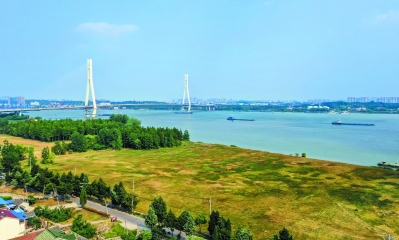

Nanjing, capital city of east China’s Jiangsu province, has made solid progress in ecological and environmental protection by fighting the tough battle against pollution over the past five years.

(Photo/Nanjing Daily)
Taking protection of the ecological environment of the Yangtze River as a priority, the city has strengthened ecological conservation and resolved acute environmental problems during the 13th Five-Year Plan period (2016-2020).
Data from the Jiangsu Provincial Department of Ecology and Environment indicate that such efforts are paying off. As of the end of November 2020, the average concentration of PM2.5 in the city was 29 micrograms per cubic meter, a year-on-year decline of 25.6 percent and the lowest measurement in the province.
To ensure better protection instead of overdevelopment, Nanjing launched an ecological rehabilitation program along the banks of the Yangtze River and removed production facilities along the river bank.
Since 2018, the city has removed production facilities along a total of 21.5 km of riverbanks and restored over 3,000 mu (200 hectares) of wetland every year, lifting the percentage of riverbanks returning to their original appearance to 77.9 percent from 51 percent.
The Yuzui Wetland Park in Jianye district has become a popular destination for citizens. Located at the intersection of the Yangtze River, Jiajiang River and Qinhuai River, the park was once full of sandpits and oil depots. Thanks to the ecological rehabilitation campaign, people now can roam around the beautiful park.
During the past five years, Nanjing has also endeavored to protect blue skies, clear waters and clean lands.
The city has implemented the most stringent 40 measures to tackle air pollution, and launched campaigns to reduce vehicle emissions and dust. Strictly controlling total coal consumption and industrial pollution, it was the first to upgrade coal-fired power generating units with a capacity of 300,000 kilowatts and above to achieve ultra-low emissions.
Nanjing has basically eliminated black and malodorous water bodies in the city. Now, the city is formulating a new plan for environmental protection for the next five years to continuously improve its ecological environment with stricter measures.
 Fire brigade in Shanghai holds group wedding
Fire brigade in Shanghai holds group wedding Tourists enjoy ice sculptures in Datan Town, north China
Tourists enjoy ice sculptures in Datan Town, north China Sunset scenery of Dayan Pagoda in Xi'an
Sunset scenery of Dayan Pagoda in Xi'an Tourists have fun at scenic spot in Nanlong Town, NW China
Tourists have fun at scenic spot in Nanlong Town, NW China Harbin attracts tourists by making best use of ice in winter
Harbin attracts tourists by making best use of ice in winter In pics: FIS Alpine Ski Women's World Cup Slalom
In pics: FIS Alpine Ski Women's World Cup Slalom Black-necked cranes rest at reservoir in Lhunzhub County, Lhasa
Black-necked cranes rest at reservoir in Lhunzhub County, Lhasa China's FAST telescope will be available to foreign scientists in April
China's FAST telescope will be available to foreign scientists in April "She power" plays indispensable role in poverty alleviation
"She power" plays indispensable role in poverty alleviation Top 10 world news events of People's Daily in 2020
Top 10 world news events of People's Daily in 2020 Top 10 China news events of People's Daily in 2020
Top 10 China news events of People's Daily in 2020 Top 10 media buzzwords of 2020
Top 10 media buzzwords of 2020 Year-ender:10 major tourism stories of 2020
Year-ender:10 major tourism stories of 2020 No interference in Venezuelan issues
No interference in Venezuelan issues
 Biz prepares for trade spat
Biz prepares for trade spat
 Broadcasting Continent
Broadcasting Continent Australia wins Chinese CEOs as US loses
Australia wins Chinese CEOs as US loses